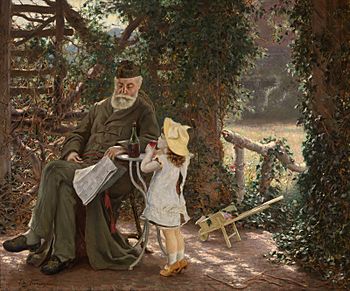Contentment facts for kids
Contentment is a calm, happy feeling. It means you are satisfied with what you have, and you feel peaceful inside. It's like a gentle kind of happiness that comes from accepting your situation.
Many wise people throughout history have talked about contentment:
- Gautama Buddha, who started Buddhism, once said, "Health is the most precious gain and contentment, the greatest wealth." This means being healthy and feeling content are the most valuable things.
- John Stuart Mill, a thinker from centuries ago, wrote, "I have learned to seek my happiness by limiting my desires, rather than in attempting to satisfy them." He meant that being happy comes from wanting less, not from getting everything you want.
- The Bible says in Hebrews 13:5, "Keep your lives free from the love of money and be content with what you have." It teaches that God will always be with you, so you don't need to chase money to be happy.
- The Chinese philosopher Zhuang Zhou wrote that a wise person is "contented with whatever time may bring." This means accepting life as it comes.
- Socrates, a famous Greek philosopher, said, "He who is not contented with what he has, would not be contented with what he would like to have." This means if you're not happy with what you have now, getting more things won't make you happy either.
These ideas all suggest that contentment comes from being happy with what you have, rather than always trying to get more. Things like a strong family, a good community, and having your basic needs met (like food and safety) can make it easier to feel content.
Contents
What is Contentment?
Many religions talk about a goal of lasting happiness or heaven. They often compare this to feeling unhappy forever. The feeling of not being satisfied often comes from comparing what you have to what you think is ideal.
Some ancient texts suggest that when people started to understand the difference between good and bad, they also began to notice a gap. This gap was between what they thought was perfect and what they were actually experiencing. This feeling of a gap can cause stress and unhappiness.
Another way to find contentment is to live "in the moment." This means focusing on what is happening right now, instead of worrying about the past or future. However, it can be hard to stay in the present. Our minds often get distracted by thoughts, memories, and things around us. This is why many religious and spiritual practices, like meditation and prayer, help people learn to focus on the present. Studies have shown that prayer can help religious people feel better.
Practicing contentment as an attitude is also helpful. This is similar to practicing gratitude, which means being thankful for what you have. When you see contentment as an attitude, it means you can choose to feel content at any time, no matter what you have.
Robert Bruce Raup, an American philosopher, wrote that people have a deep need for inner peace. He believed this need drives much of human behavior. Today, many people enjoy hobbies and activities to relax and feel content. This shows a desire to return to a peaceful state away from busy daily life.
Contentment and Positive Psychology
Contentment is closely linked to happiness and satisfaction. In a field called positive psychology, scientists study what helps people live a good life. They look at what makes people feel more positive and generally happy with their lives.
In positive psychology, happiness is seen in two ways. First, it's about having more positive feelings than negative ones. Second, it's about how satisfied you are with your life overall. Contentment is very much about this second part: how satisfied you feel with your life.
A book called Lucky Go Happy : Make Happiness Happen! showed that being content for a long time can make you happier than being extremely excited for a short time.
Positive psychology focuses on how people can be happy and thrive. It also looks at how people adapt and function well. This is different from other areas of psychology that often focus on what goes wrong with people. Humans are very good at adapting to both good and bad things in life. Usually, life events don't affect our mood for a very long time.
What Makes People Happy?
Satisficers vs. Maximizers
These are two ways people make choices. A "satisficer" makes a decision once they find something that meets their needs. A "maximizer," on the other hand, will keep looking until they have explored every possible option before deciding.
Genes
Some studies suggest that our genes might play a role in how content we feel. Research has found that genetics can influence a person's overall well-being and happiness. Genes seem to affect personality traits that are linked to happiness. More recent studies have even found specific gene receptors that impact how we process emotions and how happy we feel.
Personality
Our personality also affects our happiness. Scientists often describe personality using five main traits: openness to experience, conscientiousness, extraversion, agreeableness, and neuroticism (emotional instability). Research shows that about half of our personality traits are inherited.
Two personality traits are strongly linked to happiness. People who are more "extraverted" (outgoing and social) tend to be happier. Also, people who are less "neurotic" (meaning they are more emotionally stable) tend to be happier. Studies have also found that people who feel more content tend to care less about money and material things.
Goals
Reaching goals that are important to you can make you feel more confident and capable. It's good to set goals that are challenging but not too hard. Also, spending energy trying to avoid goals can make you less happy and stop you from achieving what you want.
Money
Many people think that having a lot of money will make them happy. While wealth can help with some things, like better health, it doesn't have a huge impact on happiness once your basic needs are met. Beyond a certain point, more money doesn't lead to much more happiness. This is called "diminishing marginal utility of income."
When you have enough to meet your basic needs, spending or giving some money away can actually make you happier. Happiness is about how your energy flows. Just hoarding more and more money, thinking it will bring happiness, can lead to the opposite feeling.
Leisure
The idea of work-life balance is very important today. The "life" part includes activities for your personal time. Sometimes these activities require as much effort as work.
In some places, "life" activities might include caring for older family members, taking kids to school, cooking, and cleaning. These are also like work, and it can be hard to find time for leisure activities.
Leisure, like going on trips, meeting friends at a cafe, or attending concerts, has become very popular. This trend shows that people have a natural need for leisure. This need for relaxation and enjoyment is part of being human. It's often lost when school and adult responsibilities take over.
Leisure helps people relax from the stress of work. It's often used for activities that reduce stress, like browsing the internet or playing games. Leisure also allows people to connect with family and friends, bringing happiness from simply talking or sharing a meal.
Health
Ancient teachings from places like India and China always linked spiritual well-being with physical health. They believed that to be truly happy or content, you needed a healthy body. Practices like Hatha yoga and qigong, along with herbal medicines, were part of these teachings. They saw personal development as a complete growth of a person's mind and body.
The idea that the body and mind affect each other is called psychosomatic medicine. This idea has always been part of traditional Chinese medicine (TCM). For example, a TCM doctor might tell an unhappy patient that their internal organs have "trapped heat" and treat them with herbs.
Having good health is very important for happiness. It's hard to be happy or content when your body is not well. While a few rare people can overcome physical challenges, for most, knowing how to stay healthy is key to their own happiness and the happiness of their family and friends.
Laughter
Laughter is often seen as a sign of happiness. When something unexpected happens, like a joke or tickling, it can cause a temporary break in our usual thoughts or feelings. This allows our natural contentment to break through and express itself as happy laughter.
Laughter has been used as a health therapy. Some hospitals show TV comedies to patients. Laughter clubs have also formed in some countries to promote laughter for health. Recent findings support the saying, "Laughter is the best medicine."
Social Welfare Systems
Contentment has also been studied as a cultural idea. Countries in Northern Europe, like Norway and Sweden, often rank high in happiness surveys. They believe this is because of their strong welfare system, called the "Nordic model." This system provides healthcare, social support, and other basic needs, which gives people a strong sense of security.
Some research suggests that people in these countries might sometimes exaggerate their happiness in surveys. This could be because their culture discourages showing negativity or unhappiness.
Contentment in Religions
Judaism
One of the earliest ideas of contentment comes from Judaism. It's called Samayach B'Chelko, which means "happy with one's portion." The Mishnah, an ancient Jewish text, says, "Who is rich? Those who are happy with their portion."
This idea is also found in the Book of Proverbs in the Bible: "A joyful heart makes a cheerful face; A sad heart makes a despondent mood. All the days of a poor person are wretched, but contentment is a feast without end."
During the Middle Ages, the Jewish philosopher Solomon Ibn Gabirol taught: "Who seeks more than he needs, hinders himself from enjoying what he has. Seek what you need and give up what you need not. For in giving up what you don't need, you'll learn what you really do need."
Christianity
Jesus Christ taught about different kinds of "satisfactions," called beatitudes. For example, he said, "Blessed are the poor in spirit, for the Kingdom of Heaven is theirs." He also taught that love is the most important thing for harmony and individual happiness. Christians believe that true gratitude comes from accepting Christ and trusting that you will have everything you need through Him.
In the Bible, the Seventy disciples were told to "Be content" (Luke 10:7). They were told to stay in the first home that welcomed them and not look for better places. Christianity believes that being happy and satisfied in life is essential.
Islam
In Islam, true contentment is found by building a relationship with Allah (God) and always remembering Him. The Quran teaches that the more people chase worldly things, the more they desire and feel empty. But those who seek God find greater peace of mind. This means that searching for the divine is a natural human desire and the ultimate goal of life.
Eastern Religions
In Yoga, physical movements, breathing exercises, and concentration can help create a feeling of contentment (santosha). This also includes following certain ethical guidelines.
Buddhism
Contentment, called santutthi in Pāli, means being free from worry, wanting, or craving. It is an important quality mentioned in many Buddhist scriptures. In the Dhammapada, contentment is called the greatest wealth. Lord Buddha taught that wise people are content with simple things, like old clothes, simple food, and basic lodging.
Sikhism
Contentment, known as Sabar or Santokh, is a key part of Sikh life. It is considered the "First Treasure." Sikhism divides contentment into two forms: regular Contentment and True Contentment (Satt Santokh/Sabar). Regular contentment can be broken if a person becomes greedy. But True Contentment can never be broken, and a soul with it can reach a very high spiritual state. A person who has contentment is called a Saabari or Santokhi.
See also
 In Spanish: Satisfacción para niños
In Spanish: Satisfacción para niños
 | Jewel Prestage |
 | Ella Baker |
 | Fannie Lou Hamer |





